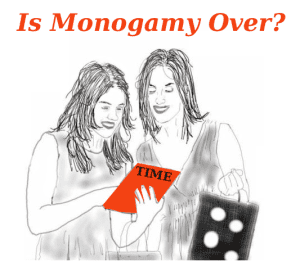 The headline ‘Is monogamy over?’ emblazoned TIME Magazine’s September 21, 2015 issue.
The headline ‘Is monogamy over?’ emblazoned TIME Magazine’s September 21, 2015 issue.
Feeling skeptical, I bought it. Its brevity trifled with the subject.
Biologist David Barash has suggested that monogamy conflicts with our biology. However, he also states that child care recommends monogamy: “It’s very rare for any species to engage in bi-parental care unless the males are guaranteed that they are genetically related to the offspring – confidence only monogamy can provide.” (1)
I must correct Barash, confidence in paternity ONLY comes from a paternity test. Both monogamy and paternity often display disappointed expectations. The insistence on bi-parental child care calls up the nuclear family model, a recent invention in human history. In the book Mothers and Others: The Evolutionary Origins of Mutual Understanding, Sarah Blaffer-Hrdy set out an evolutionary-based case for cooperative breeding (including others beyond parents) as one reason our species has survived. Regarding paternity, she recalled the story of a Naskapi tribesman who criticized a Jesuit missionary. “Seeing the priest’s dismay at the group’s sexual promiscuity and uncertain paternity, the man responded: ‘Thou hast no sense. You French people love your own children, but we love all the children of the tribe.’ To which Sarah added; “Spoken like a true cooperative breeder.” (2)
Arguably, our socially imposed monogamy involves much deceit as exemplified in both cheating and prostitution. And it seems ill adapted to facts. When we count how often monogamy fails to guarantee bi-parental child care, it suggests strong reasons to doubt Baresh’s thesis. He remarked in the article that “what makes human beings special” is our ability to do something other than what “comes naturally”, due to being prompted by a “social imposition” which I take to be praise or blame. The social imposition holds true when used against his thesis. Society could just as easily respond to the impulses toward fear-based possessiveness with an imposition of disapproval just as we do fear-based chauvinism or racism. We could live without the idea of ownership concerning lovers.
Baresh also explained non-monogamous behavior in women as related to “better genes for their children, improved access to material resources and social advancement.” His biological explanation neglects non-monogamous and LGBT women who make their own living and do not intend to have any children or any more children. I know women in this category and we must wear blinders to conveniently dismiss them.
Andy Stanley suggested that “we desire intimacy – to know and to be fully known without fear. Intimacy is fragile. Intimacy is powerful. And intimacy is fueled by exclusivity.” (3) Imagine Stanley’s argument, ‘intimacy is fueled by ‘blank’ and replace the ‘blank’ with some conduct associated with sexual relations from one or two centuries ago. The conduct would rest on the same grounds, but have incredibly different ideas about conduct.
We may cling to the false sense of security that monogamy pretends to give, as a child clings to a security blanket. We may lose our security blanket and feel inconsolably insecure at the loss, but does that loss mean that the blanket really kept us safe from anything? Our affections and our customs are NOT the same thing. Mr. Stanley appears to suggest that intimacy improves when we restrict it, which seems unfounded at best. His word “fueled” also seems curious. His statement explicitly means that a lack of alternative choices sustains intimacy. This rhetorical preaching to the choir brings to mind arguments from the past opposing social progress. To treat any custom about sexual relations as the best possible conduct simply ignores all the past change for the better.
‘…when I was young, then there were a whole different vocabulary for talking to women. … It was a totally different thing. You wouldn’t dream of saying a word of truth to a woman. It would be gross and impertinent and horrible. You just lied blankly and it was essential to good manners that you should. And, in all those ways, I mean the relations of men and women are infinitely much better than they were when I was young.’
Bertrand Russell, Audio Interview 1961 (4)
Here’s a more detailed refutation of the intimacy requires exclusivity belief. Ideas contrary to the monogamous tradition exist, even if they are now in a minority. This fact proves nothing against non-monogamy. All social change begins in a minority.
There were two pro non-monogamous voices in the TIME article. The first voice criticized monogamy involving institutionalized deceit. The second voice focused on what seemed a Mormon arguing for the legalization of polygamy using property rights as an argument.
In the future, TIME magazine should include a broad variety of non-monogamous situations when discussing non-monogamy. Such content would help monogamous people understand the differences and problems involved in non-monogamy and help those people beginning to question monogamy to understand if, at least for them, monogamy is a dead and dishonest tradition.

Pingback: Dispute monogamy for 5 more reasons | No Shame in Sex
Pingback: Non-monogamy, a growing morality | No Shame in Sex
Pingback: Non-monogamy, a growing morality | No Shame in Sex